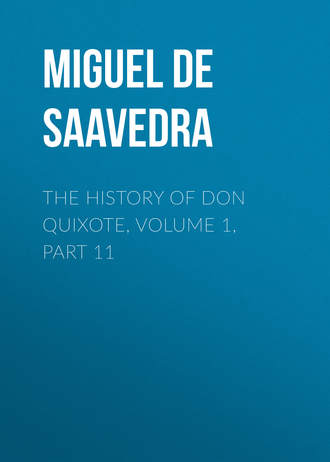
Мигель де Сервантес Сааведра
The History of Don Quixote, Volume 1, Part 11
"Let us be gone in the name of God to bring aid to this great lady."
The barber was all this time on his knees at great pains to hide his laughter and not let his beard fall, for had it fallen maybe their fine scheme would have come to nothing; but now seeing the boon granted, and the promptitude with which Don Quixote prepared to set out in compliance with it, he rose and took his lady's hand, and between them they placed her upon the mule. Don Quixote then mounted Rocinante, and the barber settled himself on his beast, Sancho being left to go on foot, which made him feel anew the loss of his Dapple, finding the want of him now. But he bore all with cheerfulness, being persuaded that his master had now fairly started and was just on the point of becoming an emperor; for he felt no doubt at all that he would marry this princess, and be king of Micomicon at least. The only thing that troubled him was the reflection that this kingdom was in the land of the blacks, and that the people they would give him for vassals would be all black; but for this he soon found a remedy in his fancy, and said he to himself, "What is it to me if my vassals are blacks? What more have I to do than make a cargo of them and carry them to Spain, where I can sell them and get ready money for them, and with it buy some title or some office in which to live at ease all the days of my life? Not unless you go to sleep and haven't the wit or skill to turn things to account and sell three, six, or ten thousand vassals while you would be talking about it! By God I will stir them up, big and little, or as best I can, and let them be ever so black I'll turn them into white or yellow. Come, come, what a fool I am!" And so he jogged on, so occupied with his thoughts and easy in his mind that he forgot all about the hardship of travelling on foot.
Cardenio and the curate were watching all this from among some bushes, not knowing how to join company with the others; but the curate, who was very fertile in devices, soon hit upon a way of effecting their purpose, and with a pair of scissors he had in a case he quickly cut off Cardenio's beard, and putting on him a grey jerkin of his own he gave him a black cloak, leaving himself in his breeches and doublet, while Cardenio's appearance was so different from what it had been that he would not have known himself had he seen himself in a mirror. Having effected this, although the others had gone on ahead while they were disguising themselves, they easily came out on the high road before them, for the brambles and awkward places they encountered did not allow those on horseback to go as fast as those on foot. They then posted themselves on the level ground at the outlet of the Sierra, and as soon as Don Quixote and his companions emerged from it the curate began to examine him very deliberately, as though he were striving to recognise him, and after having stared at him for some time he hastened towards him with open arms exclaiming, "A happy meeting with the mirror of chivalry, my worthy compatriot Don Quixote of La Mancha, the flower and cream of high breeding, the protection and relief of the distressed, the quintessence of knights-errant!" And so saying he clasped in his arms the knee of Don Quixote's left leg. He, astonished at the stranger's words and behaviour, looked at him attentively, and at length recognised him, very much surprised to see him there, and made great efforts to dismount. This, however, the curate would not allow, on which Don Quixote said, "Permit me, senor licentiate, for it is not fitting that I should be on horseback and so reverend a person as your worship on foot."
"On no account will I allow it," said the curate; "your mightiness must remain on horseback, for it is on horseback you achieve the greatest deeds and adventures that have been beheld in our age; as for me, an unworthy priest, it will serve me well enough to mount on the haunches of one of the mules of these gentlefolk who accompany your worship, if they have no objection, and I will fancy I am mounted on the steed Pegasus, or on the zebra or charger that bore the famous Moor, Muzaraque, who to this day lies enchanted in the great hill of Zulema, a little distance from the great Complutum."
"Nor even that will I consent to, senor licentiate," answered Don Quixote, "and I know it will be the good pleasure of my lady the princess, out of love for me, to order her squire to give up the saddle of his mule to your worship, and he can sit behind if the beast will bear it."
"It will, I am sure," said the princess, "and I am sure, too, that I need not order my squire, for he is too courteous and considerate to allow a Churchman to go on foot when he might be mounted."







